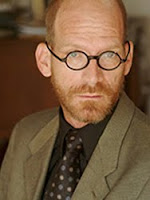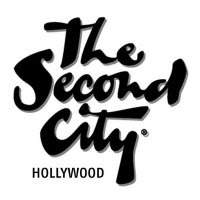This week, we feature an interview with Ron West, the Director and Managing Editor of Second City This Week. Ron West has been with The Second City for a long time. He has directed shows in Chicago, Detroit, Cleveland, and Los Angeles. He was a consultant to "Whose Line Is It Anyway?" and appeared on "Third Rock From the Sun". His play The People vs. Friar Laurence is available from Samuel French. He throws right and bats right & left. You can see Second City This Week Saturdays at 8pm in the Second City Hollywood Theater.
Please share your experience studying sketch/improv.
That's too lo ng of a story with no beginning and no end. I had an improv group in college, as is required of all undergraduate students. I studied improv informally for a about a year and a half in Chicago. My loud voice made me eminently qualified for sketch and improv because sometimes you have to shout over loud bar patrons. I am still learning now, and I've always learned more from when it went badly than from when it went well.
ng of a story with no beginning and no end. I had an improv group in college, as is required of all undergraduate students. I studied improv informally for a about a year and a half in Chicago. My loud voice made me eminently qualified for sketch and improv because sometimes you have to shout over loud bar patrons. I am still learning now, and I've always learned more from when it went badly than from when it went well.
Were there any coaches or teachers you particularly learned from?
My primary teachers were Don DePollo, Michael Gellman, Rick Thomas, and Del Close. I learned a lot from Bernie Sahlins, too, though I don't think I ever took a class from him. I'm not sure who first said, "Say yes and make statements when improvising," but a lot of times all I do is go through the script and take out "no" and the questions.
Do you have some memorable Second City moments?
Yes. A few times I've improvised or watched an improvisation and said, "Well, that was very good," we rehearsed it for an hour the next day and then had a sketch we were able to repeat 6 nights a week for a year. A few times I've seen something that was terrible but rethinking it made it a fun, repeatable sketch. And one time we didn't have any material and God sent a lightning bolt and created a scene and I cried with joy.
Tell us about your first improv/sketch show. How did you feel about it?
It was the funniest show ever. Everything went perfectly. People confined to wheelchairs were healed. The second show was not as good.
How do you feel your improv/sketch work has grown since you started?
It has gotten taller.
How do you think improv and sketch compare?
In improv you have to follower the follower. In sketch, at least one of you has to be able to type.
What are some of the exciting aspects of each one?
In improv, it is usually best if you work slowly. You get a lot of laughs off you and the audience making discoveries at the same time. In sketches, it is usually best if you talk loud and fast and worry about the art later. I think sometimes people see sketches and then try to emulate sketches in their improv. The best improvs and best sketches have the fewest jokes.
How do you feel your improv/sketch training helps you in other acting jobs, or just life in general?
Improv and sketch teach you to make instant choices. And when the producer or director says, "Make another choice," the improviser can do so easily. Improv has not helped me in my life in general because whenever anyone asks, "Can you give me $5?" I agree to do so and so I am broke.
What do you think are the most important attributes of a strong improvisor?
Able improvisers listen instead of talking so much. They make their scene partners look good. Their scenes have some kind of physical center and it doesn't seem like they are merely trying to shout as many jokes as possible.
Is there a certain performer or group that you really admire? What do you admire about them?
Maybe you've heard of this group called Monty Python's Flying Circus. I admire that they became rich.
Is there something that you do even now to keep your improv/sketch skills sharp?
I always wear a sport jacket or suit on stage.
Do you have some advice for people who may just be starting their improv/sketch training?
Tell the truth.
Please share your experience studying sketch/improv.
That's too lo
 ng of a story with no beginning and no end. I had an improv group in college, as is required of all undergraduate students. I studied improv informally for a about a year and a half in Chicago. My loud voice made me eminently qualified for sketch and improv because sometimes you have to shout over loud bar patrons. I am still learning now, and I've always learned more from when it went badly than from when it went well.
ng of a story with no beginning and no end. I had an improv group in college, as is required of all undergraduate students. I studied improv informally for a about a year and a half in Chicago. My loud voice made me eminently qualified for sketch and improv because sometimes you have to shout over loud bar patrons. I am still learning now, and I've always learned more from when it went badly than from when it went well.Were there any coaches or teachers you particularly learned from?
My primary teachers were Don DePollo, Michael Gellman, Rick Thomas, and Del Close. I learned a lot from Bernie Sahlins, too, though I don't think I ever took a class from him. I'm not sure who first said, "Say yes and make statements when improvising," but a lot of times all I do is go through the script and take out "no" and the questions.
Do you have some memorable Second City moments?
Yes. A few times I've improvised or watched an improvisation and said, "Well, that was very good," we rehearsed it for an hour the next day and then had a sketch we were able to repeat 6 nights a week for a year. A few times I've seen something that was terrible but rethinking it made it a fun, repeatable sketch. And one time we didn't have any material and God sent a lightning bolt and created a scene and I cried with joy.
Tell us about your first improv/sketch show. How did you feel about it?
It was the funniest show ever. Everything went perfectly. People confined to wheelchairs were healed. The second show was not as good.
How do you feel your improv/sketch work has grown since you started?
It has gotten taller.
How do you think improv and sketch compare?
In improv you have to follower the follower. In sketch, at least one of you has to be able to type.
What are some of the exciting aspects of each one?
In improv, it is usually best if you work slowly. You get a lot of laughs off you and the audience making discoveries at the same time. In sketches, it is usually best if you talk loud and fast and worry about the art later. I think sometimes people see sketches and then try to emulate sketches in their improv. The best improvs and best sketches have the fewest jokes.
How do you feel your improv/sketch training helps you in other acting jobs, or just life in general?
Improv and sketch teach you to make instant choices. And when the producer or director says, "Make another choice," the improviser can do so easily. Improv has not helped me in my life in general because whenever anyone asks, "Can you give me $5?" I agree to do so and so I am broke.
What do you think are the most important attributes of a strong improvisor?
Able improvisers listen instead of talking so much. They make their scene partners look good. Their scenes have some kind of physical center and it doesn't seem like they are merely trying to shout as many jokes as possible.
Is there a certain performer or group that you really admire? What do you admire about them?
Maybe you've heard of this group called Monty Python's Flying Circus. I admire that they became rich.
Is there something that you do even now to keep your improv/sketch skills sharp?
I always wear a sport jacket or suit on stage.
Do you have some advice for people who may just be starting their improv/sketch training?
Tell the truth.
